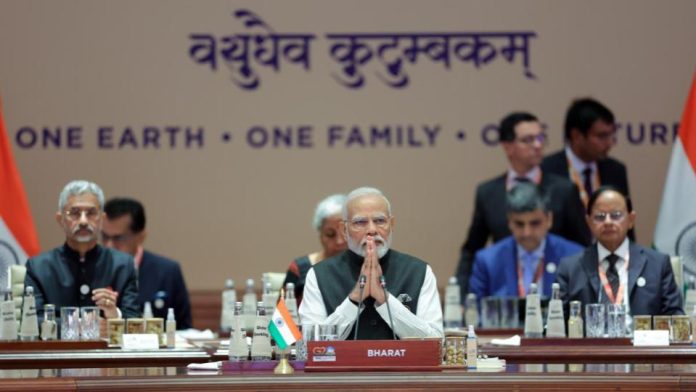In a historic triumph, the G20 nations have embraced the New Delhi declaration during India’s G-20 leadership, amid growing tensions over the Ukraine conflict. This momentous achievement follows India’s strategic efforts to bring global leaders together at the G-20 Summit in New Delhi, where they tackle pressing global issues.
PM Modi, while addressing the summit, stated, “There is good news… with our team’s hard work and with the help of everyone involved, the New Delhi G20 Leaders’ Summit Declaration has reached a consensus.” With those words, he officially declared the adoption of the declaration by banging a ceremonial gavel.
Finding consensus among G20 members has become increasingly challenging in recent years, mainly due to deep divisions among key members regarding issues such as Russia’s war in Ukraine and climate change funding. Here are the top highlights from the summit.
Key Takeaways from the G20 Summit
- A New Permanent Member: The African Union has been granted the status of a new permanent member of the G20, updating the group’s acronym to G21. This development is seen as a significant step towards reshaping the global order and giving developing nations a more influential voice in global decision-making. In June, India proposed granting full G20 membership to the African Union, consisting of 55 countries, a move that has now been realized. The idea was initiated after discussions at the ‘Voice of the Global South’ summit in January, which included the participation of many African countries. Further talks on this proposal took place in Addis Ababa, Ethiopia, where the African Union is headquartered. Previously, the only African country in the G20 was South Africa.
- Global Connectivity Initiative: At the G20 Summit, Prime Minister Narendra Modi and world leaders introduced a new trade route called the India-Middle East-Europe corridor, connecting the United States, India, Saudi Arabia, Gulf and Arab states, and the European Union. This corridor might offer another option to China’s Belt and Road project, which has led many developing nations into significant debt.
- Delhi Declaration: The Delhi Declaration was adopted, was adopted unanimously by the group. This declaration calls on nations to uphold international law, including principles related to territorial integrity, sovereignty, international humanitarian law, and the multilateral system that promotes peace and stability. It is also presented as an alternative to China’s Belt and Road initiative, which has led many developing countries into significant debt.
- Global Biofuel Alliance: PM Modi announced the launch of the Global Biofuel Alliance, a pivotal step toward promoting cleaner energy sources. This alliance is expected to expedite global efforts to achieve net-zero emissions by facilitating the trade of biofuels derived from various sources, including plant and animal waste. Prime Minister Narendra Modi proposed launching a ‘G20 Satellite Mission’ for monitoring the environment and climate. He also suggested the creation of a ‘Green Credit Initiative’.
Need To Deal Global Trust Deficit
In his address, Prime Minister Modi also emphasized the need to overcome the rising “global trust deficit” through greater cooperation among G20 member countries.
The New Delhi G20 declaration, as outlined by India’s G20 Sherpa Amitabh Kant, underscores the commitment to fostering strong, sustainable, balanced, and inclusive growth. It places a significant emphasis on accelerating progress towards achieving the Sustainable Development Goals (SDGs) and forging a Green Development Pact for a sustainable future. Additionally, it highlights the importance of modernizing multilateral institutions and reinvigorating multilateralism for the 21st century. These focus areas demonstrate the collective dedication of G20 nations to address global challenges and shape a better future for all.

